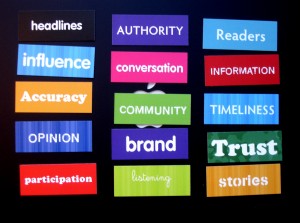In this week’s readings, Manovick describes the internet as a database with no beginning, middle and end. Databases store data that is utilised in the digital space for organisation and ease of retrieval via search engines.
I tend to agree that the internet in itself does not follow traditional narrative structure as a book would. The internet does not follow a story. It is made up of a collection of various websites, that contain their own stories and narratives within.
Databases stored in print form, such as encyclopaedias, still have a narrative structure, as they are arranged for example alphabetically by topic. This can be true to the internet too, as stories within the overall database are arranged in their own narrative sequence. It may not be the overall internet that is a narrative, but there are narratives within the big database.





